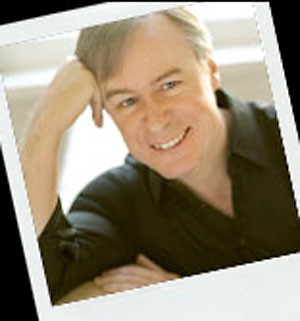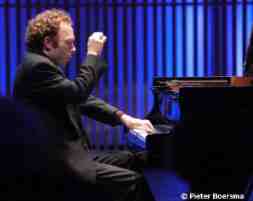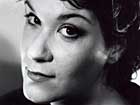Hayden, Bernstein and Ives
 BBC Prom No 5, 17 July BBC Prom No 5, 17 July
Sam Hayden
Substratum (BBC commission: world premiere)
Bernstein
Symphony No. 2, 'The Age of Anxiety'
Ives
Symphony No. 4
Orli Shaham piano
Ralph van Raat piano
London Philharmonic Choir
BBC Symphony Orchestra
David Robertson (pictured) and Matthew Rowe conductors
This was potentially an interesting programme, one to go to the Albert Hall so as to hear it live, but in the event it seemed to us misconceived and doomed to failure.
The first casualty was the extremely dense and demanding new work, of which only a part was heard because of (wholly predictable) limitations of rehearsal time.
Seeking to embrace "post-minimalism and new complexity" in an art that "resists commodification" in "a personally satisfyingly complicated musical voice that resists easy categorization", what emerged (even to open-minded regular listeners to new music) was a dense, confusing and indeed inchoate and repellent noise. Academic teachers of composition have a lot to answer for... I shall avoid the complete performance promised for the winter.
In introducing Bernstein's near-forgotten symphony/concerto The Age of Anxiety the notes writer berated Auden for the "sheer wordiness" of his "lengthy and self-indulgent metaphysical meditations", without demonstrating even excerpts for us to read; apparently the solo piano was to represent "an autobiographical figure".
Heard in 2007, this 1949 score sounded derivative and (often) trite, a piece to 'collect' by hearing once, but not again...
After watching the trojan efforts of the BBC removal men re-setting the platform for Ives at his most grandiose, we heard the deliberately confused and bewildering Symphony No 4, which needs at least two conductors to keep things going in simultaneously conflicting tempi * - an exhilarating experience under David Robertson's enthusiastic direction which, in retrospect, justified the journey across London (instead of catching the last evening of Charlotte Forrest's little Britten festival in City churches, whose audience had grown by its culmination the same night). Unfortunately, in contrast, the crowded Albert Hall platform for this Prom Spectacular was mirrored by a sparse audience...
The solo piano had at least been audible and effective in the Bernstein whereas, in the Ives No. 4 the much admired solo pianist Ralph van Raat  - in UK from Amsterdam especially - was little to be heard from 'good' stalls seats; the choir seated behind the orchestra would have been better placed to hear his intricate contribution. - in UK from Amsterdam especially - was little to be heard from 'good' stalls seats; the choir seated behind the orchestra would have been better placed to hear his intricate contribution.
Balance was bettered on BBCR3's Listen Again - still available on line - but this amazing work really does demand to be seen as well as heard.
BBC 4's viewers will have had the best of it, and the Ives Symphony No.4 is one that lends itself imperatively to DVD. But the camera shots for this filming - seen on video - were not thought out well enough for that. The TV producer was not listed in the programme, and the cameras did not always show quite what was needed.
There were but distant and occasional glimpses of the two conductors guiding the music in different directions, but - most surprisingly - almost nothing was to be seen of the rare thereminist (Celia Sheen) in action! The cameras did however bring into visual and auditory focus the substantial and demanding part played by Ralph van Raat, sufficiently so to make sense of his taking a personal bow and receiving a bouquet of roses.
Peter Grahame Woolf
* q.v. M P's Hyperion CD review: - - the radical No 4, here clarified with unwonted lucidity by Litton with two assistant conductors - -
Read also Anne Ozorio in Seen & Heard
The Observer's review of this concert is interesting in the context of the ongoing debate about paper v. web reviewing.
Stephen Pritchard totally ignores the Ives symphony - or perhaps his Arts Editor cut out that bit...? - - Modern music can sometimes struggle to raise much interest. - - the audience was thin for the first outing of Sam Hayden's Substratum which was in any case played incomplete - - huge blocks of dense sound with some interjections from the woodwind and brass buried deep in the mix. Hardly inspiring, and given an unusually mute reception by the prommers.Things were altogether more sprightly in Bernstein's second symphony, 'The Age of Anxiety'. It's not a piano concerto, but Orli Shaham played the prominent keyboard part - Bernstein's own response to the Auden poem of the title - with great panache in the jazzy passages, which came complete with authentic slap bass. Gorgeous.
and there it stops!! PGW
British Songs
Lunchtime Prom PCM1 – 16 July 2007
Cadogan Hall, London SW3 
Alice Coote – mezzo soprano
Graham Johnson – piono
Elgar – Speak Music Op 41
Quilter – There be none of Beauty's daughters Op 24; Now sleeps the crimson petal Op 3; Love's Philosophy Op 3
Britten – A Charm of Lullabies OP 41
Stanford – La belle dame sans merci; A Soft Day
Weir – The Voice of Desire
Warlock – Late Summer
Vaughan Williams – Silent Noon
Gurney – The boat is chafing; Lights out
We seldom get the chance to hear a whole concert of English songs – they are usually the dregs of programmes featuring aspiring sopranos or perspiring baritones.
For this Cadogan Hall Prom, however, a varied selection had been prepared by pianist Graham Johnson for that remarkable mezzo, Alice Coote. For a whole hour the audience had the privilege of listening to her interpretations of some of the most lyrical texts in the English language, in that inimitable voice.
She began, appropriately enough, with Elgar, Speak, Music praising the eloquence of music and its ability to convey unspoken thoughts. No collection would be complete without works by Britten – in this case the five cradle songs A Charm of Lullabies . These ranged from the tenderness of The Nurse's Song and Blake's Cradle Song through Burns' Highland Balou to the ferocity of Randolph 's A Charm which ends in exasperated demands for “quiet”.
The main offering was Judith Weir's The Voice of Desire, four songs described as dealing with contemporary issues which are personally important to her. Verses from varied sources probe the relationship between humankind and the natural world, which is portrayed as obeying laws which remain shrouded in mystery. The music was specially written for Alice Coote and her voice illustrated its message in a way which is surely unique.
Peter Warlock's elegiac hymn to summer Late Summer and the familiar Vaughan Williams Silent Noon reminded us of the English countryside when the sun does shine – those very precious moments of peace. The concert was brought to an end with two songs by the tragic figure of Ivor Gurney: The boat is chafing with its swaying rhythm, and the musing of Edward Thomas on the “unfathomable deep Forest ” of sleep in Lights Out.
The audience obviously craved more so Alice Coote and the indefatigable Graham Johnson gave two encores. Hear it all on BBC R 3 Saturday 21 July at 13.00 and subsequently on Listen Again.
S Jenkins |



